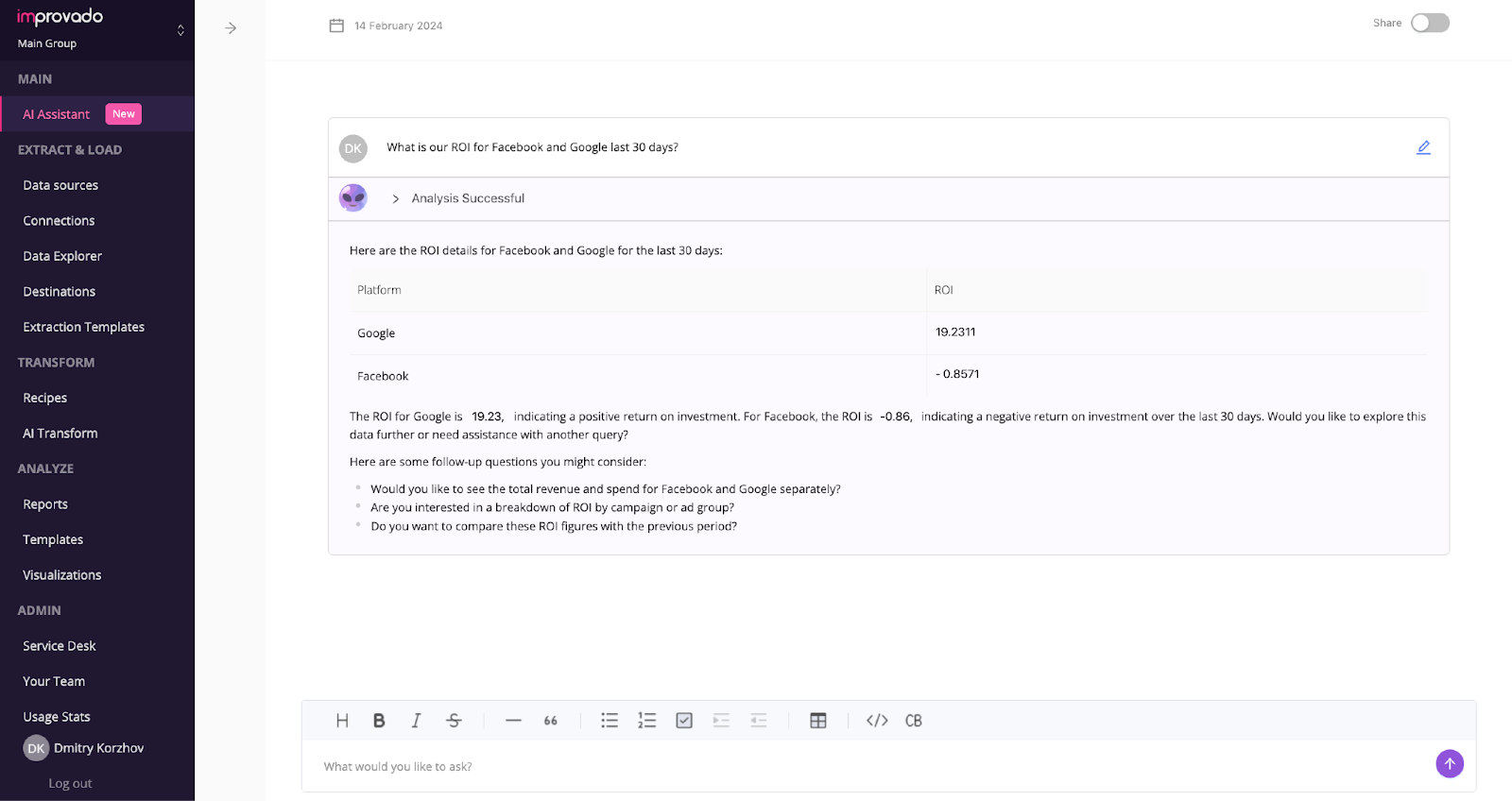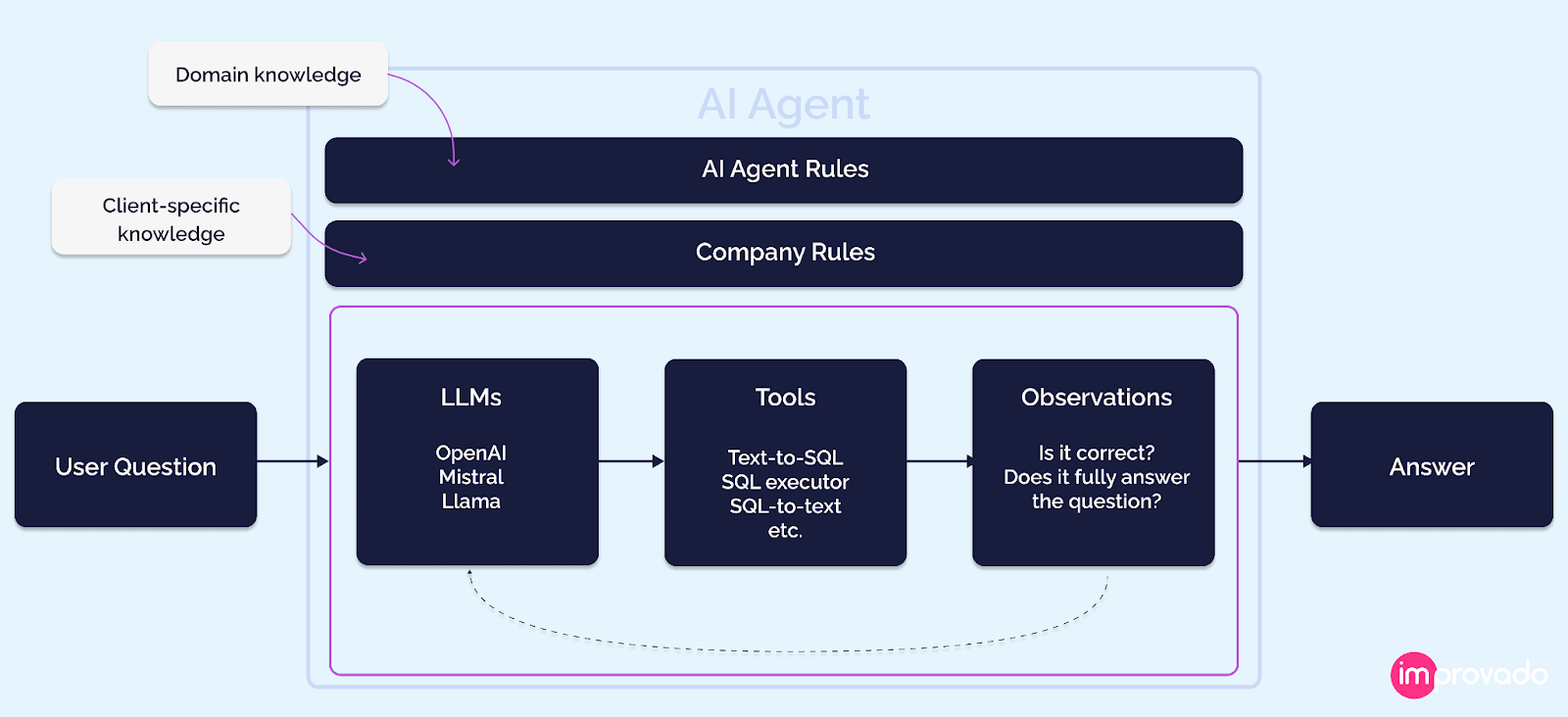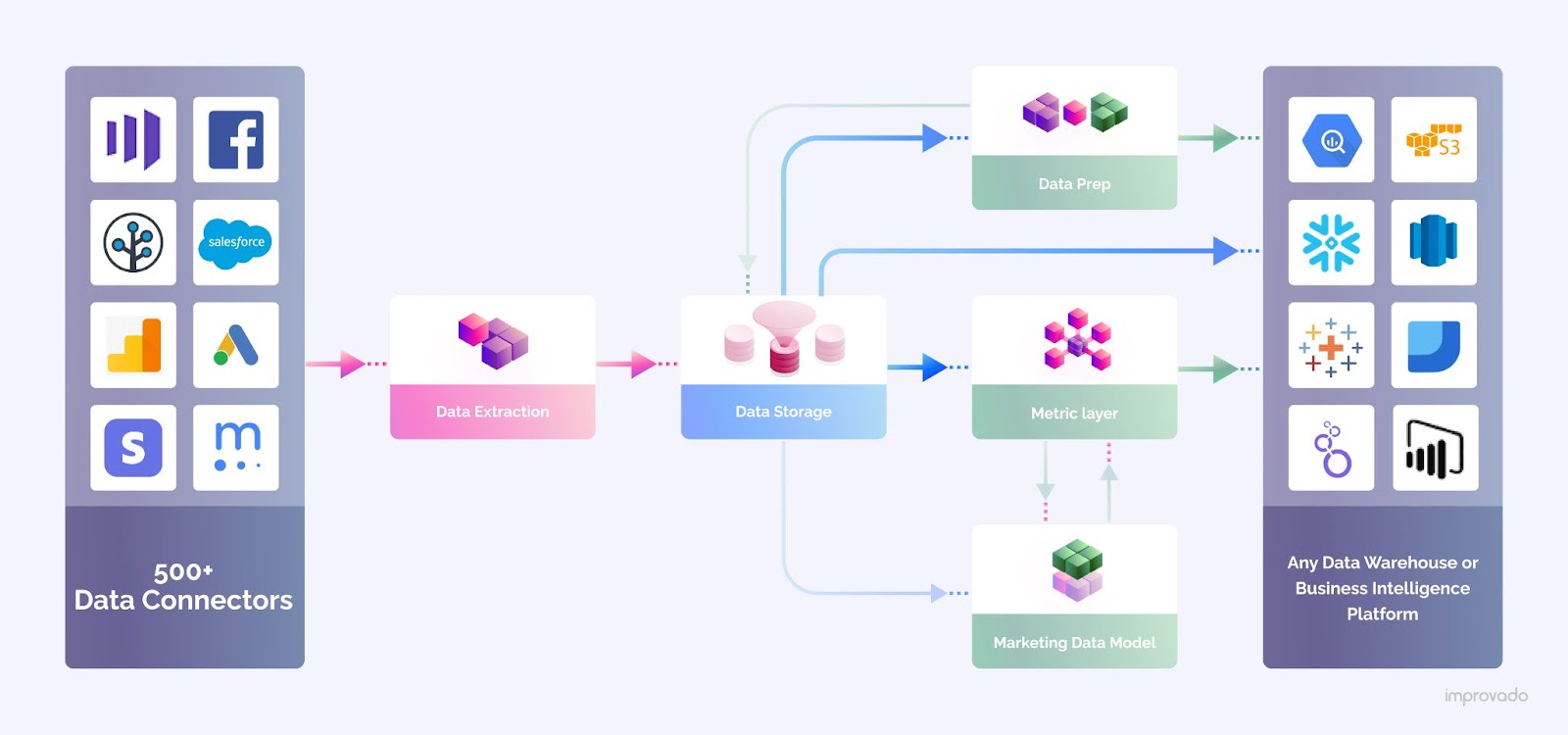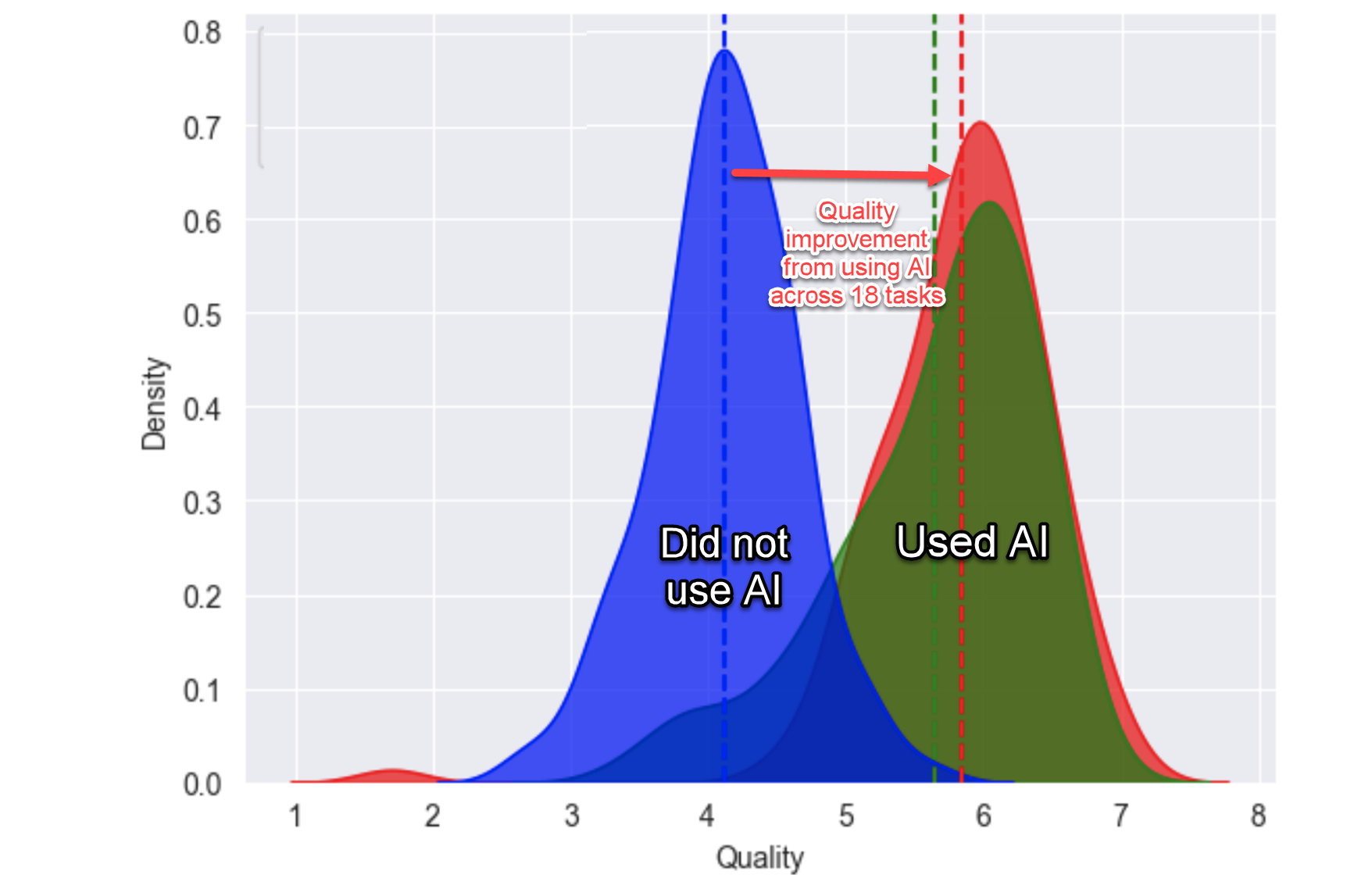AI reporting is transforming how brands analyze vast amounts of data. By leveraging AI tools, companies can now identify subtle trends, predict customer behaviors, personalize campaigns, and do it at a greater scale.
This shift means data analysis isn't just about the past anymore; it’s about anticipating future opportunities and challenges.
In this guide, we'll discover how AI reporting and AI report generators enhance data-driven strategies, help optimize customer engagement, and secure a competitive edge in the fast-evolving digital marketplace.
Understanding AI Reporting
As a result, AI reporting tools enable quicker turnaround times for delivering valuable insights. It’s like having a smart assistant for your marketing data.

This advancement in reporting technology streamlines workflows and ensures a higher level of precision and detail in the final reports, effectively meeting the evolving needs of modern businesses.
Let's take a look at how an AI report generation tool works on a real-world example.
AI Reporting Tools in Action
Improvado AI Agent exemplifies the transformative power of AI in marketing reporting.
AI Agent enables direct interaction with data through simple, natural language queries, and allows users to swiftly generate detailed reports.

The agent is like an analytics co-pilot that can:
- Build a budget pacing report: show ad spend from Google, Bing, and other platforms;
- Compare ad spend for various categories, or assess PPC spend against the remaining budget for specific timeframes, such as quarterly or annually.
- Present the data as graphs, charts, or tables, and export it to CSV.
How does it work?

The agent runs on the Improvado data platform. Improvado comes with over 500 pre-built APIs for popular marketing and sales platforms and an enterprise-grade data transformation engine that collects all your marketing data and prepares it for further analysis. Thus, AI Agent is able to derive valuable insights based on accurate and high-quality data.
- You type the question, for example, What are the top five campaigns by ROAS on each platform for the last 30 days?
- AI Agent translates English into SQL and queries your dataset to deliver answers or reports.
- Once you have your answer, you can easily ask follow-up questions to delve deeper.
Ultimately, AI Agent is like a front-end for your dataset.
Actionable Insights
AI report generators, like agent-based models, are ideal for addressing specific analytical questions and gaining real-time insights. But what if you want to proactively identify trends and receive guidance on where to focus to optimize performance?
Actionable Insights is another example of AI-generated reports. The tool delivers period-over-period reports and alerts for any opportunities and anomalies, bringing you attention to campaigns that require interventions.

How does it work?
The reports you get are generated by Improvado AI Agent. The agent is constantly monitoring and analyzing your data.
The reports are fully customizable: you can specify the analysis period—weekly, bi-weekly, or monthly—and define its structure and KPIs. It will serve as a template and help AI Agent create reports tailored to your needs.
You may choose to analyze ad campaigns, look out for organic metrics, or analyze other aspects of your marketing strategy. Actionable Insights includes a summary of performance indicators and personalized recommendations for performance improvement.
The Technology Behind AI Report Generators
Machine learning (ML) and natural language processing (NLP) are the foundational pillars of AI report generators. While both are subsets of artificial intelligence, they serve distinct yet complementary roles in the process of AI reporting.
Machine learning (ML): the brain of the operation
In the context of report generation, ML algorithms sift through data, discern patterns, and extract meaningful insights. Over time, as the system is exposed to more data, it refines its algorithms, ensuring that the generated reports are increasingly precise and relevant.
Natural language processing (NLP): making sense of data
NLP ensures that the reports produced are not just a jumble of numbers and facts but are structured in a way that's easily understandable. This involves tasks like sentence formation, grammar checks, and context understanding.
Large language models (LLMs): crafting detailed narratives from data
Large language models (LLMs) take AI reporting a step further by generating detailed, narrative-driven reports from data.
The strength of LLMs lies in their ability to contextualize statistics and findings, making them more relatable and easier to understand. This involves sophisticated language skills like narrative structuring, contextual interpretation, and clear communication of complex insights.
Synergy of ML and NLP
The true magic happens when machine learning and natural language processing work in tandem.
While ML dives deep into data, identifying patterns and drawing conclusions, NLP takes these conclusions and crafts them into comprehensive reports. This synergy ensures that AI report generators deliver outputs that are both data-driven and user-friendly.
Data management technologies: ensuring quality inputs for accurate outputs
In AI reporting, the phrase "garbage in, garbage out" holds true.
The quality of insights generated by AI is directly linked to the quality of the underlying data.
Data management technologies like Improvado are crucial in this context, as they aggregate, normalize, and perform quality assurance on data from various marketing and sales platforms.
A robust data platform along with AI technologies play a pivotal role in ensuring that the data fed into AI systems is accurate, complete, and consistent. This involves complex processes of data cleansing, deduplication, and integration, ensuring that disparate data sources are harmonized and ready for analysis.

Benefits of Using AI for Report Generation
Embracing the power of artificial intelligence has led to transformative changes in how we generate and understand reports. Delving into the benefits of AI for report generation reveals a future where efficiency, customization, and accuracy are not just desired but expected.
1. Swift and efficient reporting process: the speed advantage
One of the most notable advantages of AI report generators is their speed.
Traditional reporting methods might require hours or even days to compile, analyze, and present data. In contrast, AI-powered tools can accomplish these tasks in mere minutes, ensuring that businesses can make timely decisions based on the latest data.
While AI reporting is new, we already have studies that prove the transformative effect of AI integration on operational efficiency.

A group of social scientists from Harvard Business School studied how ChatGPT-4 affects the daily work of a global management consulting firm. The study has shown that specialists using AI finished 12.2% more tasks on average, completed tasks 25.1% more quickly, and produced 40% higher quality results than those without.
2. Tailored to your needs: the power of adaptability
Every organization and individual has unique reporting needs. AI report generators are designed with this in mind. They possess the ability to adapt to various data sets and requirements, ensuring that the output aligns with the specific needs of the user. Whether it's a specific format, certain data points, or particular visualizations, AI tools can be customized to deliver precisely what's needed.
3. Accuracy at Its best: minimizing human error
Human error is a natural part of any manual process. Whether it's due to oversight, fatigue, or simple miscalculations, mistakes can creep into manually generated reports.
AI report generators, however, are immune to such pitfalls. By automating the data analysis and report generation process, these tools ensure a level of accuracy that's hard to achieve through manual methods. This not only instills confidence in the reports but also ensures that decisions made based on them are sound.
Limitations and Challenges of AI Reporting
While AI report generators have undeniably transformed the landscape of data analysis and reporting, it's essential to recognize that they are not without their challenges and limitations.
By being aware of these potential pitfalls, users can make more informed decisions and optimize the benefits of these tools.
- Data dependency: One of the primary limitations of AI report generators is their heavy reliance on data. The quality of the generated report is directly proportional to the quality of the input data. If the data is incomplete, biased, or inaccurate, the AI will produce misleading or incorrect reports.
- Lack of human intuition: AI lacks human intuition and the ability to understand context in the way humans do. This can sometimes lead to reports that, while technically accurate, might miss nuances or subtleties. Consider a scenario where a marketing team launches a new campaign that coincides with a major, unrelated news event. The AI reporting tool, analyzing data trends, might attribute a sudden spike in website traffic solely to the effectiveness of the new campaign. However, a human marketer might recognize that the traffic increase could partially or entirely result from heightened online activity due to the news event, not just the campaign.
- Over-reliance on automation: There's a risk that users might become overly reliant on AI for report generation, sidelining critical thinking and manual analysis. This over-reliance can lead to missed opportunities for deeper insights that a human analyst might catch.
- Complexity and learning curve: While many AI report generators are designed to be user-friendly, some advanced tools come with a steep learning curve. Users might need training or expertise to harness their full potential effectively.
The Ethics of AI Report Generation
The integration of AI into various sectors, including report generation, has brought forth a myriad of benefits. However, with these advancements come ethical considerations that warrant reflection and discussion.
- Bias and fairness: AI systems are trained on vast datasets, and if these datasets contain biases, the AI can inadvertently perpetuate or even amplify them. This can lead to skewed or misleading reports, which can have significant implications, especially in sectors like finance, healthcare, and law.
- Data privacy and security: AI report generators require access to data to function. Ensuring that this data is handled securely and that individuals' privacy is maintained is paramount. There's also the question of consent – do individuals know and agree to how their data is being used?
- Authenticity and accountability: With AI-generated reports, there's a potential risk of misinformation or inaccuracies. Determining accountability in such cases becomes challenging. Is the AI system at fault, or is it the developers behind it? And how can users verify the authenticity of an AI-generated report?
Looking Forward
As AI report generation technology advances, we anticipate more precise and contextually aware analytics tools. The focus will likely shift towards enhancing AI's interpretive capabilities, mitigating biases, and integrating more diverse data sources for well-rounded insights.
For marketers and C-level stakeholders, this means a future where AI tools not only automate reporting process but also provide deeper, actionable insights, tailored to specific business contexts.
Get a demo with Improvado to have an AI-powered marketing analytics co-pilot by your side 24/7.
.png)
.jpeg)




.png)
